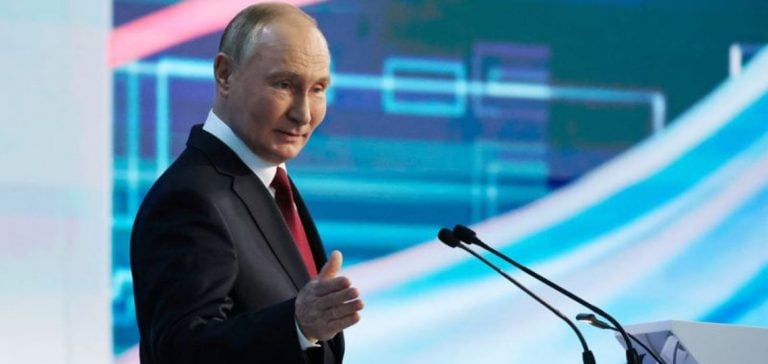At the Russian Energy Week forum, Vladimir Putin made it clear that Western sanctions, deemed “illegal”, have not prevented Russia from maintaining its crucial role in the global energy supply.
With a third of Russian budget revenues coming from oil and gas, Moscow is seeking to diversify its partners to circumvent restrictions and guarantee its energy export flows.
The BRICS, a strategic counterweight to sanctions
The BRICS – Brazil, Russia, India, China and South Africa – play a central role in Russia’s energy strategy.
Putin points out that these sanctions-free nations now account for 90% of Russian energy export payments.
This strategic realignment enables Russia to maintain stable trade flows despite Western financial and logistical restrictions.
Growing imports of Russian oil by China and India demonstrate that these countries are now preferred customers, consolidating trade relations with Moscow.
Strengthening ties with these emerging powers gives Russia the flexibility it needs to bypass Western markets, thus limiting the impact of sanctions on its economy.
By multiplying its bilateral agreements with these countries, Russia is securing both outlets for its hydrocarbons and long-term strategic partnerships.
Increased cooperation with OPEC+.
Russia’s commitment to OPEC+ strengthens.
Putin affirmed that Russia continues to respect its commitments within the alliance of oil producers, thus ensuring the stability of the world market.
OPEC+ plays a key role in regulating world oil supply, helping to stabilize prices and avoid excessive fluctuations, which is vital for exporting economies like Russia.
Russia’s collaboration with other OPEC+ members has been crucial in mitigating the impact of global demand declines observed during the COVID-19 pandemic.
Today, against a backdrop of global economic recovery and rising geopolitical tensions, OPEC+ remains an instrument for controlling production levels and managing the balance between supply and demand.
As a major oil producer, Russia continues to exert a decisive influence within this group.
Readjusting Russia’s energy strategy
Faced with the logistical and financial difficulties associated with sanctions, Russia has had to adapt its energy strategy.
Restrictions on international payment systems have forced Moscow to reassess its transaction methods, with increasing use of local currencies and alternative payment systems.
Putin spoke of the need to update the national energy strategy in the coming months, to ensure the sector’s resilience in the face of growing challenges.
Russia’s continued exports to Asian countries, particularly China and India, show that these obstacles can be overcome.
However, Russia must also face up to the transition to a less hydrocarbon-dependent economy in the medium and long term.
To achieve this, it could step up investment in other energy segments, while retaining its traditional resources as its main source of revenue.
Impact on global energy markets
Russia’s strategy of relying on the BRICS and OPEC+ has a direct impact on the evolution of global energy flows.
By seeking partners outside the West, Moscow is reshaping the geopolitics of energy.
The increase in trade between Russia and Asian nations, particularly in crude oil, marks a reorientation of Russian exports towards non-sanctioned markets.
This realignment also has consequences for European markets, which, despite efforts to diversify their sources of supply, continue to feel the effect of reduced Russian deliveries.
Cooperation with OPEC+ enables Russia to regulate world oil supply, while maintaining relatively stable prices, thus helping to limit the impact of sanctions on its revenues.
Strengthening energy partnerships with the BRICS and OPEC+ enables Russia to stabilize its economy and ensure the continuity of its energy exports despite sanctions.
This strategy of circumventing sanctions through non-Western alliances represents a significant shift in global energy geopolitics.





















